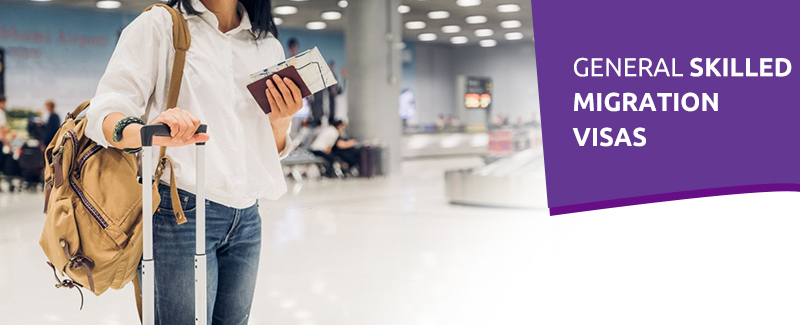General Skilled Migration Visas (GSM) are visas that allow skilled workers to live and work in Australia permanently. The visa category is designed for individuals with certain skills and experience who wish to live and work in Australia.
Also, there are numerous benefits of studying in Australia as it can be a pathway to obtaining a General Skilled Migration Visa. This can allow international students to work in Australia and ultimately obtain permanent residency.
Moreover, this visa category addresses skill shortages in various industries and promotes economic growth in the country. This blog post will discuss the types of GSM visas, their advantages and disadvantages, and how NepaliNAATI CCL can help in earning five Australian PR points.
🔔 Don’t Miss: How difficult is Nepali NAATI CCL?
Types of General Skilled Migration visas
There are four types of General Skilled Migration visas available. Each visa type has its own eligibility requirements and conditions.
Let’s walk through each one in detail.
1. Skilled Independent Visa (subclass 189)
The Skilled Independent Visa (subclass 189) is a points-based visa that is intended for skilled workers who do not have a sponsor or nomination from an Australian employer or state or territory government. This visa is designed for applicants who have skills that are in demand in the Australian labor market.
Eligibility criteria
To be eligible for the Skilled Independent Visa, applicants must meet several requirements. Firstly, they must have an occupation that is listed on the Medium and Long-term Strategic Skills List (MLTSSL) or the Short-term Skilled Occupation List (STSOL). They must also have a positive skills assessment from the relevant assessing authority for their occupation.
Applicants must also meet the minimum English language requirement, which can be demonstrated through an English language test such as IELTS, TOEFL, PTE Academic, or Cambridge Advanced English (CAE). The age limit for this visa is 45.
Moreover, visa holders can live and work in Australia indefinitely and have access to the same benefits as Australian citizens. They can also sponsor eligible family members for permanent residency in Australia.
Overall, the Skilled Independent Visa provides an excellent opportunity for skilled workers to obtain permanent residency in Australia. It is a highly sought-after visa category, and applicants must meet strict eligibility criteria and score well on the points-based system to be eligible.
2. Skilled Nominated Visa (subclass 190)
The Skilled Nominated Visa (subclass 190) is a points-based visa that is intended for skilled workers who have a nomination from an Australian state or territory government. This visa is designed for applicants who have skills that are in demand in the specific state or territory where they have been nominated.
Eligibility criteria
To be eligible for the Skilled Nominated Visa, applicants must meet several requirements. Firstly, they must have an occupation that is listed on the Medium and Long-term Strategic Skills List (MLTSSL) or the Short-term Skilled Occupation List (STSOL).
Furthermore, applicants must also meet the minimum English language requirement, which can be demonstrated through an English language test such as IELTS, TOEFL, PTE Academic, or Cambridge Advanced English (CAE). The age limit for this visa is 45.
One of the key advantages of the Skilled Nominated Visa is that it provides permanent residency in Australia. They can also sponsor eligible family members for permanent residency in Australia.
Also, the Skilled Nominated Visa can provide a pathway to citizenship. After living in Australia for a certain period of time as a permanent resident, visa holders may be eligible to apply for Australian citizenship.
3. Skilled Regional (Provisional) Visa (subclass 489)
The Skilled Regional (Provisional) Visa (subclass 489) is a temporary visa that allows skilled workers to live and work in regional areas of Australia for up to four years. This visa is designed to encourage skilled workers to live and work in areas outside of major cities and contribute to the development of regional areas in Australia.
Eligibility criteria
To be eligible for the Skilled Regional (Provisional) Visa, applicants must meet several requirements. Firstly, they must have an occupation that is listed on the Medium and Long-term Strategic Skills List (MLTSSL) or the Short-term Skilled Occupation List (STSOL).
However, obtaining a Skilled Regional (Provisional) Visa can be competitive, as there are limits to the number of visas that are issued each year. Applicants are assessed based on a points-based system, which takes into account factors such as age, English language proficiency, education, work experience, and other relevant criteria.
Overall, the Skilled Regional (Provisional) Visa is a highly sought-after visa category, and applicants must meet strict eligibility criteria and score well on the points-based system to be eligible.
4. Skilled Work Regional (Provisional) Visa (subclass 491)
The Skilled Work Regional (Provisional) Visa (subclass 491) is a new points-based visa introduced by the Australian government in November 2019. This visa is designed to encourage skilled workers to live and work in regional areas of Australia and contribute to the development of these areas.
To be eligible for the Skilled Work Regional (Provisional) Visa, applicants must be nominated by an Australian state or territory government agency or sponsored by an eligible family member living in a designated regional area of Australia. They must also have an occupation that is on the Medium and Long-term Strategic Skills List (MLTSSL) or the Regional Occupation List (ROL). Additionally, they must meet the minimum English language requirement and score at least 65 points on the points-based system.
Overall, the Skilled Work Regional (Provisional) Visa provides an excellent opportunity for skilled workers to live and work in designated regional areas of Australia and potentially obtain permanent residency in Australia. It is a highly sought-after visa category, and applicants must meet strict eligibility criteria and score well on the points-based system to be eligible.
Advantages of General Skilled Migration Visa
There are several advantages of General Skilled Migration Visas that make them an attractive option for individuals seeking to immigrate to Australia. Here are some of the main advantages:
1. No Sponsorship is Required
Unlike other types of visas, such as employer-sponsored visas, General Skilled Migration Visas do not require a sponsoring employer or family member. This means that applicants have more flexibility and control over their visa application.
2. Work and Study Opportunities
General Skilled Migration Visas allow applicants to work and study in Australia. This can provide opportunities to gain valuable work experience, improve language skills, and enhance education qualifications.
3. Permanent Residency
Depending on the type of General Skilled Migration Visa, successful applicants may be eligible for permanent residency in Australia. This provides long-term stability and security for individuals and families.
4. Access to Healthcare and Social Services
General Skilled Migration Visa holders have access to the same healthcare and social services as Australian citizens, which can include Medicare, public schools, and other government benefits.
5. Pathway to Citizenship
Permanent residents who have lived in Australia for a certain period of time and meet other eligibility criteria may be eligible to apply for Australian citizenship. This provides additional rights and benefits, including the ability to vote and hold public office.
Disadvantages of General Skilled Migration Visas
While General Skilled Migration Visas offer many advantages, there are also some potential disadvantages that applicants should be aware of. Here are some of the main disadvantages:
1. Competitive Application Process
General Skilled Migration Visas are highly sought-after, and the application process can be competitive. Applicants must meet strict eligibility criteria and score well on the points-based system to be considered.
2. Time-Consuming Process
The General Skilled Migration Visa application process can be lengthy and time-consuming, often taking several months to complete. Applicants must gather a significant amount of documentation and undergo medical and background checks.
3. English Language Requirement
General Skilled Migration Visas require a certain level of English language proficiency, which can be a challenge for some applicants. This can be particularly difficult for applicants from non-English speaking backgrounds.
4. Financial Requirements
Applicants must demonstrate that they have sufficient funds to support themselves and any dependents while living in Australia. This can be a barrier for some applicants who do not have significant savings or financial resources.
5. Geographic Limitations
Some General Skilled Migration Visas are restricted to specific geographic regions or states in Australia, which can limit job opportunities and other factors.
Overall, while General Skilled Migration Visas offer many benefits, applicants should be aware of the potential challenges and drawbacks. It is important to carefully consider all factors and seek professional guidance to determine if a General Skilled Migration Visa is the best option for their specific situation.
About NepaliNAATICCL
NepaliNAATICCL is an expert in NAATI accreditation for the NAATI CCL test online and adds 5 points to your PR application. Moreover, NepaliNAATICCL offers various packages to help you prepare for your Nepali NAATI CCL test. You can choose the package that best suits your needs.
Once you enroll in one of our NAATI CCL preparation courses, their experts will guide you by enhancing your vocabulary and helping you to understand the terminology used in the NAATI CCL dialogues. This will enable you to speak accurately and confidently during the test.
In summary, if you want to ensure that you score well in the NAATI CCL test and obtain those all-important 5 extra points for your PR application, NepaliNAATICCL can help you achieve your goal. Our expert coaching, online courses, and personalized guidance will provide you with the support you need to succeed.
✅ Also check out: Family-Sponsored Visa
Conclusion
General Skilled Migration Visas provide many advantages, including permanent residency, career opportunities, education opportunities, and regional opportunities. However, the visa category is highly competitive and can be expensive.
With the right preparation and support, skilled workers can achieve their dream of living and working in Australia through the General Skilled Migration Visa category. Nevertheless, you can always check your eligibility from the official website.
The visa category provides many advantages and disadvantages. While it can be a great way to migrate to Australia, it can also be a challenging process that requires careful consideration and planning.
Furthermore, If you have any queries regarding visa applications in Australia NepaliNAATICCL is always available to answer them.
FAQ
What are the eligibility requirements for a General Skilled Migration Visa?
To be eligible for a General Skilled Migration Visa, you must have a nominated occupation that is on the relevant skilled occupation list, meet the minimum English language requirements, be under 45 years of age, and score the minimum number of points required in the skilled migration points test.
How long does it take to process a General Skilled Migration Visa application?
Processing times for General Skilled Migration Visa applications can vary depending on the visa subclass and the individual circumstances of the applicant. Generally, processing times can range from several months to a year or more.
Can I include my family members in my General Skilled Migration Visa application?
Yes, you can include your spouse or de facto partner, dependent children, and other dependent relatives in your General Skilled Migration Visa application. However, they must meet the relevant eligibility criteria and be included in your application at the time of lodgment.
How many points do I need to score in the skilled migration points test to be eligible for a General Skilled Migration Visa?
The minimum number of points required to be eligible for a General Skilled Migration Visa can vary depending on the visa subclass and the individual circumstances of the applicant. Generally, you must score at least 65 points in the skilled migration points test to be eligible. However, some visas require a higher points score to be eligible.









